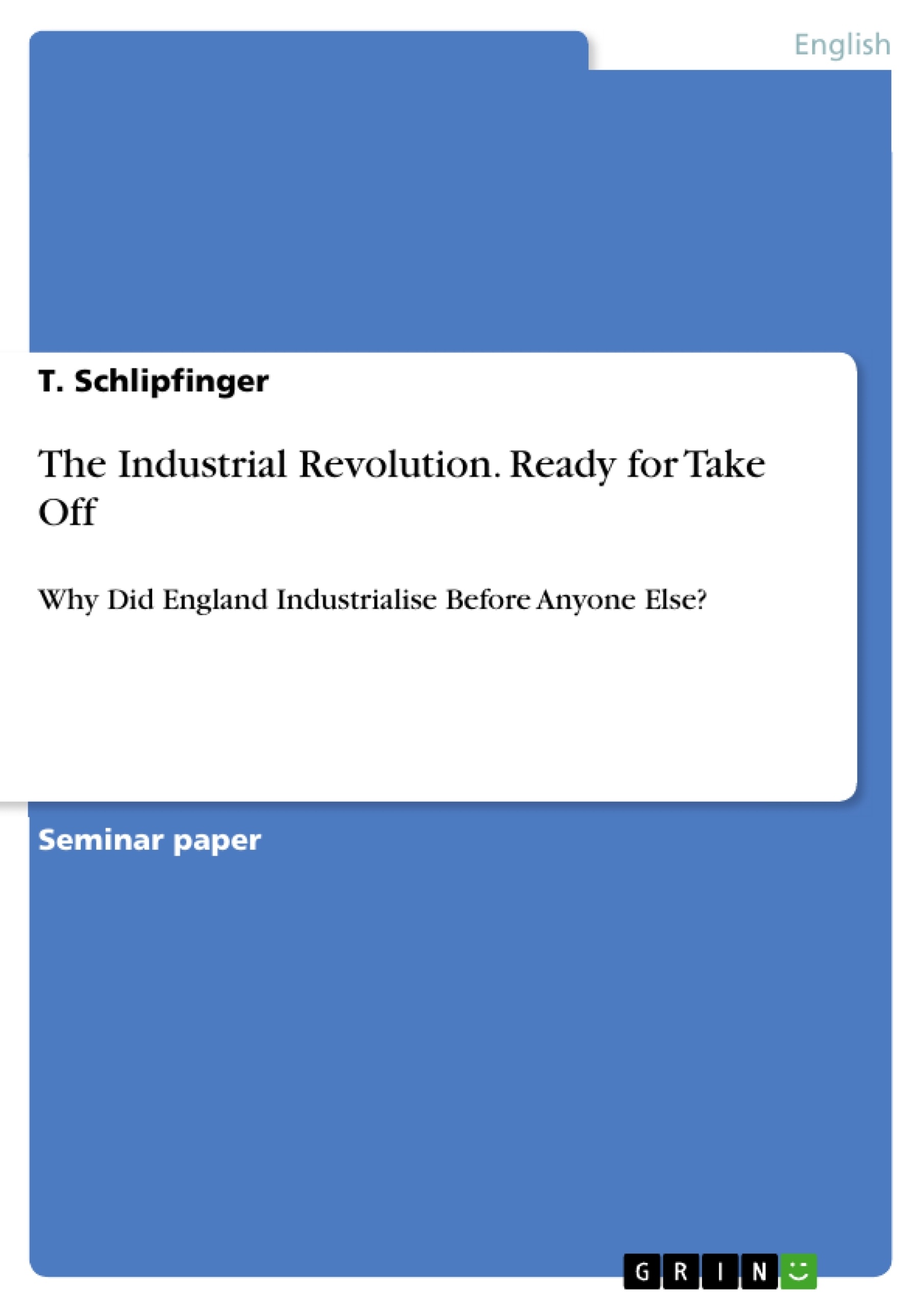Without doubt, the Industrial Revolution is one of the most important events in human his-tory. For better or worse, it changed lives throughout England and soon afterwards contin-ued to do so also in Europe and the rest of the world. But already here lies one of the mys-teries of the Industrial Revolution. Why did it start in England (or at least, in parts of Eng-land)? What was so special about this island off the European continent’s cost that made it possible for it to develop in the eighteenth and nineteenth century so much faster than any of its competitors (at least out of a technological point of view)? For there certainly were competitors – other countries like France or the Netherlands but also outside Europe, like China or Japan – that were in a similar position, but somehow failed to industrialise before England did. The aim of this paper is to look for an answer to this seemingly simple question.
Inhaltsverzeichnis (Table of Contents)
- I | INTRODUCTION
- II | KEY CHARACTERISTICS OF THE INDUSTRIAL REVOLUTION
- Terminology
- III | CAUSES OF THE INDUSTRIAL REVOLUTION IN ENGLAND.
- CAPITAL ACCUMULATION
- THE POPULATION'S INCREASING DEMAND
- TECHNICAL INNOVATION
- CHANGING WORLDVIEW
- IV | ENGLAND'S FAVOURABLE STARTING POSITION
- THE NEED FOR A REVOLUTION
- COMPARISON ENGLAND FRANCE
- V | RESULTS OF THE INDUSTRIAL REVOLUTION IN ENGLAND
- ECONOMIC CHANGES
- TECHNICAL BREAKTHROUGHS
- SOCIOLOGICAL CHANGES
- Working Conditions
- Urbanisation
- North-South Divide
- VI | CONCLUSION
Zielsetzung und Themenschwerpunkte (Objectives and Key Themes)
This paper aims to investigate the reasons behind England's unique position as the birthplace of the Industrial Revolution, exploring why it industrialized before other nations. The paper focuses on key factors contributing to this historical development, including:- The defining characteristics of the Industrial Revolution
- The various causes that led to its emergence in England
- England's advantageous starting position compared to other countries
- The far-reaching consequences of the Industrial Revolution on England's society and economy
Zusammenfassung der Kapitel (Chapter Summaries)
- I | INTRODUCTION: This chapter sets the stage for the analysis by presenting the Industrial Revolution as a pivotal event in human history and highlighting the key question: Why did England industrialize first? The chapter outlines the paper's structure, dividing it into four main sections that will explore the characteristics, causes, England's starting position, and the resulting effects of the Industrial Revolution.
- II | KEY CHARACTERISTICS OF THE INDUSTRIAL REVOLUTION: This chapter defines the Industrial Revolution as a significant shift in economic and cultural structures, driven by technological advancements that resulted in mechanized production and agricultural innovations. The chapter also discusses the accompanying social changes, particularly the evolving relationship between workers and employers, urbanization, and population growth.
- III | CAUSES OF THE INDUSTRIAL REVOLUTION IN ENGLAND: This chapter delves into the factors that contributed to England's industrialization, emphasizing that multiple elements were at play. It explores key factors like capital accumulation, the growing demand of the population, technical innovation, and a changing worldview.
- IV | ENGLAND'S FAVOURABLE STARTING POSITION: This chapter examines England's advantageous starting position, highlighting the need for a revolution and contrasting England's situation with that of other countries, such as France. It analyzes the factors that enabled England to experience the key technological breakthroughs that marked this pivotal moment in history.
- V | RESULTS OF THE INDUSTRIAL REVOLUTION IN ENGLAND: This chapter explores the significant effects of the Industrial Revolution on England, examining economic changes, technological advancements, and social transformations, including working conditions, urbanization, and the North-South divide.
Schlüsselwörter (Keywords)
The key terms and concepts explored in this paper include the Industrial Revolution, technological innovation, economic growth, social change, urbanization, capital accumulation, population growth, and England's unique position within the global context. This paper examines the factors contributing to the Industrial Revolution, analyzing England's specific circumstances that led to its early industrialization.Frequently Asked Questions
Why did the Industrial Revolution start specifically in England?
England's early industrialization was driven by a unique combination of capital accumulation, technical innovation, increasing population demand, and a favorable geographical position.
What are the key characteristics of the Industrial Revolution?
Key features include the shift from manual to mechanized production, significant agricultural innovations, urbanization, and a transformation in the relationship between workers and employers.
How did the Industrial Revolution change English society?
It led to mass urbanization, the emergence of a North-South economic divide, changes in working conditions, and rapid population growth.
How did England's position compare to competitors like France?
While France and others had potential, England had more favorable starting conditions for technological breakthroughs and a worldview more conducive to industrial change.
What were the most significant technical breakthroughs mentioned?
The paper highlights technical innovations that enabled mechanized production and revolutionized the textile and energy sectors.
- Quote paper
- T. Schlipfinger (Author), 2011, The Industrial Revolution. Ready for Take Off, Munich, GRIN Verlag, https://www.grin.com/document/193960



